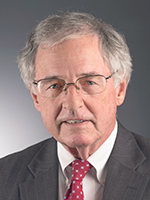Henry M. Coxe III, Esquire
2016 American Inns of Court Professionalism Award for the Eleventh Circuit

Henry M. Coxe III’s distinguished legal career in Florida all started when he ran out of money visiting friends and later landed a lucky break at a gas station.
After graduating from Washington and Lee University School of Law, Coxe was visiting friends in Gainesville, Florida, and spent all of his cash in about nine days. He was familiar with nearby Jacksonville because of summers spent working for the U.S. Merchant Marine to pay for college and law school, so he headed to Jacksonville to look for a position as a lawyer. He soon learned that Florida wouldn’t admit him to the bar without his bar results from Virginia and a background check, a lengthy process that took about a year to finalize. The Virginia Bar results received no reciprocity.
While he waited, he took a job as a gas station attendant—back in the day when employees pumped gas, washed windshields, and checked the oil and tire pressure. One day, he was chatting to a customer, who asked about his plans. It turned out the man was Ed Austin, a former (and future) Florida state attorney.
“It was no more than a 30-second visit,” Coxe says. “He said he knew of a couple of openings in the state attorney’s office, and two days later, that’s what I was doing.”
Coxe spent six years as a prosecutor before he and another prosecutor set up their own criminal defense office. From there, his career took off. Coxe is a Fellow of the American College of Trial Lawyers. He received the Florida Bar Foundation’s Medal of Honor and has been named one of the 10 best criminal trial lawyers in Florida for several years. In 2014, the American Bar Foundation named Coxe as an outstanding state chair. He has been honored for his pro bono work by the Florida Bar and the City of Jacksonville.
Currently, Coxe is a director in the firm of Bedell, Dittmar, DeVault, Pillans & Coxe, P.A., of Jacksonville, which he joined in 1996. He specializes in serious federal and state criminal matters.
Coxe never forgot what Austin did for him and has worked to help and mentor other lawyers, especially young lawyers, along the way. It’s important when “people who have been around awhile are willing to take the time to work with [young lawyers],” he says. He points to the adage “don’t forget where you came from.”
Twice a year in Jacksonville, Coxe chairs a panel of judges for a professionalism and ethics course that Florida requires lawyers to take within a year of passing the bar. Coxe relishes the opportunity to offer advice to the 250 young lawyers. He encourages them to not be afraid to ask more experienced lawyers questions.
“Nobody’s going to hang up on you or tell you they don’t have time, so seize the moment, and you can learn a lot by doing that,” he says. “That’s where you get your best advice.”
Coxe has also been actively involved in trying to reduce the number of wrongful convictions in Florida. In 2010, he was appointed to Florida’s Innocence Commission, which was tasked with developing recommendations to the state Supreme Court to eliminate or reduce the causes for wrongful convictions. The two-year commission was created after several high-profile exonerations in the state.
Coxe said the outcome he was most proud of was pushing through a new rule in the Florida Supreme Court that requires all lawyers who work on felony cases to take a two-hour course on Brady disclosure and discovery materials. “The point some of us were making was if you look at the exonerations, these were errors committed by experienced lawyers,” he says. “These weren’t rookies, whether it was the state not revealing certain evidence or defense attorneys missing something completely.
“It was fascinating because I learned a lot,” he says. “I knew eyewitness identifications were a problem nationally, but the problems that arise from failure to record interrogations or interviews was really a tremendous education for everyone.”
Melanie Padgett Powers is a freelance writer and editor in the Washington, D.C., area who can be reached at MelEdits.com.
© 2016 American Inns of Court. This article was originally published in the November/December 2016 issue of The Bencher, a bi-monthly publication of the American Inns of Court. This article, in full or in part, may not be copied, reprinted, distributed, or stored electronically in any form without the express written consent of the American Inns of Court.